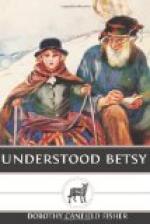She had very little hope of this, and only went back there because it seemed to her a little less dauntingly strange than every other spot in the howling wilderness about her; for all at once the Fair, which had seemed so lively and cheerful and gay before, seemed now a horrible, frightening, noisy place, full of hurried strangers who came and went their own ways, with not a glance out of their hard eyes for two little girls stranded far from home.
The bright-colored young man was no better when they found him again. He stopped his whistling only long enough to say, “Nope, no Will Vaughan anywhere around these diggings yet.”
“We were going home with the Vaughans,” murmured Betsy, in a low tone, hoping for some help from him.
“Looks as though you’d better go home on the cars,” advised the young man casually. He smoothed his black hair back straighter than ever from his forehead and looked over their heads.
“How much does it cost to go to Hillsboro on the cars?” asked Betsy with a sinking heart.
“You’ll have to ask somebody else about that,” said the young man. “What I don’t know about this Rube state! I never was in it before.” He spoke as though he were very proud of the fact.
Betsy turned and went over to the older man who had told them about the Vaughans.
Molly trotted at her heels, quite comforted, now that Betsy was talking so competently to grown-ups. She did not hear what they said, nor try to. Now that Betsy’s voice sounded all right she had no more fears. Betsy would manage somehow. She heard Betsy’s voice again talking to the other man, but she was busy looking at an exhibit of beautiful jelly glasses, and paid no attention. Then Betsy led her away again out of doors, where everybody was walking back and forth under the bright September sky, blowing on horns, waving plumes of brilliant tissue-paper, tickling each other with peacock feathers, and eating pop-corn and candy out of paper bags.
That reminded Molly that they had ten cents yet. “Oh, Betsy,” she proposed, “let’s take a nickel of our money for some pop-corn.”
She was startled by Betsy’s fierce sudden clutch at their little purse and by the quaver in her voice as she answered: “No, no, Molly. We’ve got to save every cent of that. I’ve found out it costs thirty cents for us both to go home to Hillsboro on the train. The last one goes at six o’clock.”
“We haven’t got but ten,” said Molly.
Betsy looked at her silently for a moment and then burst out, “I’ll earn the rest! I’ll earn it somehow! I’ll have to! There isn’t any other way!”
“All right,” said Molly quaintly, not seeing anything unusual in this. “You can, if you want to. I’ll wait for you here.”
“No, you won’t!” cried Betsy, who had quite enough of trying to meet people in a crowd. “No, you won’t! You just follow me every minute! I don’t want you out of my sight!”




